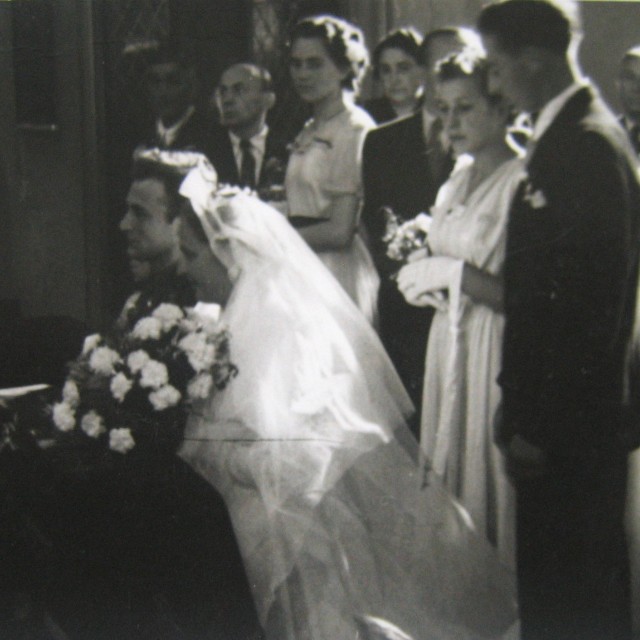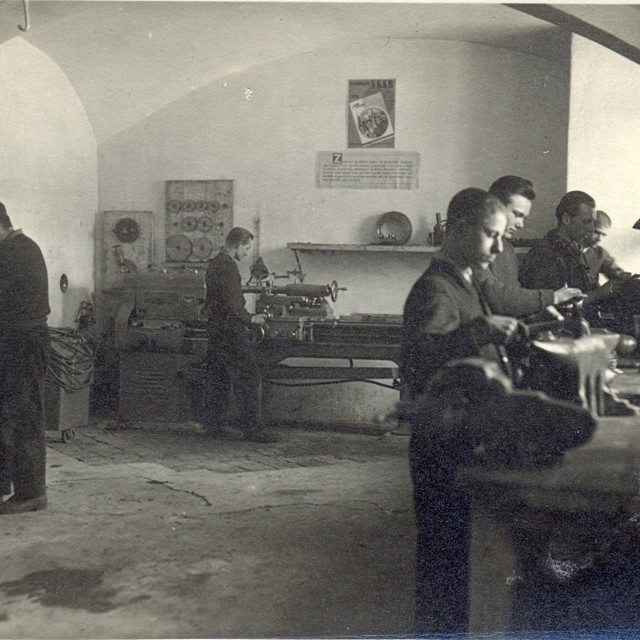
Jaroslav Grünberg
Jaroslav Grünberg was born on 24th of December 1930. His father Miloš was a worker in the Military Telecommunications deprtment at the airport in Prague-Kbely. His mother Bedřiška, born as Katzová, worked in the Melantrich printing works. Jaroslav had a sister Miroslava and a brother Arnošt. He attended basic school in Prague, but his further studies were interrupted by the War. His father's ancestors came from a German aristocratic family and so there was a pressure on him to accept German nationality. After several refusals, both father and Arnošt were imprisoned in a concentration camp. Bedřiška Grünbergová was also transported to Terezín where she was imprisoned until the end of the War. Jaroslav was left alone. At a hops-harvest brigade near Žatec, he met a German who hid him for some time in Krupá, Central Bohemia, before his uncle and aunt Katz came to bring him to their home in Prague, where young Jaroslav spent the whole War. His Father and his brother managed to escape from the concentration camp and to participate in the fights during the liberation of Prague. His brother Arnošt was later decorated with a medal with Ludvík Svoboda. His mother survived Terezín and a typhus epidemic and returned home. In the years 1945-1948, the family lead a quiet life. His parents returned to work, his sister became a seamstress, and his brother, who had studied as a cook, had become a manager of a hotel in Volary. Jaroslav began his studies as an electrician in Prague-Bubny at the Czech Railroad Company and as a leader of the Žižkov based group Lípa, he organized girl-scout camps. All the members of the family belonged to the Czechoslovak, (Hussite), Church and young Jaroslav occasionally participated in the activities of the Žižkov branch of the Church. Even though he admits that he would rather played football with his brother than attended the masses or youth church gatherings, faith, religious beliefs that were imposed mainly by his mother, have left their trace in him. Jaroslav had a more active role in the activities of the 16th division of the National Social Party youth organization at Žižkov, where he worked as a promotion coordinator. After February 1948, the situation of the Grünberg family became much more difficult. Arnošt left the country and the family caught the attention of the state police. Jaroslav and his colleagues from the 16th division didn't stay behind and began with distribution of newsletters and issued an illegal magazine. The main point of the charge was the fact that the family provided shelter for Jiří Červenka who returned to Czechoslovakia after illegal crossing of the border and participated in anti-government activities, about which all the members of the family knew. Jaroslav was arrested on 28th of May and taken to custody to the central police station at Bartolomějská street. Despite his age, he passed through brutal interrogations. The court with the Karel Kukal group took place on 6th and 7th December 1948, at the State Court in Prague. Jaroslav, at that time still juvenile, pleaded not guilty and denied some passages from his previous testimonies. He was found guilty and sentenced to three years in prison. On 8th July 1949, he was transferred to the institute for juvenile delinquents in Zámrsk. The institute was still under construction and the regime was not so rigid and the guards were benevolent. Jaroslav used to sing in a prison band and the prisoners could, for example, play football. In Zámrsk, Jaroslav also met his wife, who worked for a short time as a prison guard. They got married after the release from the prison and their marriage last until today. On 22nd February 1951 Jaroslav was released on probation with the verdict of the regional court in Pardubice on the condition that he would enter the occupation in the mining industry. He left to miner's preparation school at the institute in Žacléř. After his release from Žacléř, he immediately entered the army service and served in the Auxiliary Technical Forces on Mimoň. After two months, he was transferred to mines in Ostrava, where he spent three years. During his service at the Auxiliary Forces, he married with his wife Růženka. Even though the wedding took place in a Catholic church in Prague-Žižkov, many of the guests were prison guards. After the final release from the Auxiliary forces, Jaroslav Grünberg began to work as an electrician in Neratovice. Later on, he passed the driving test and began working as a driver at the ČSAD - the National Bus Company. He has two daughters: Jaroslava and Marie. The events of 1968 did not profoundly affect his life. He felt as a patriot, but he also felt general negligence concerning of the political prisoners from the 50s. He had the same feeling after the revolution in 1989. In November 1990, he was fully rehabilitated together with Karel Kukal and six other members of the group by the Municipal Court in Prague.





